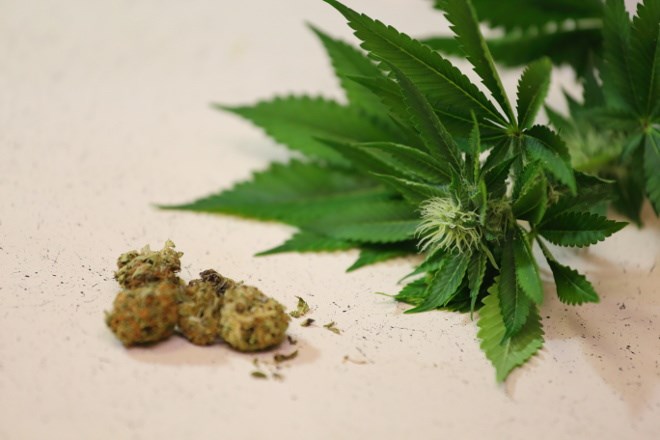After successfully helping farmers cultivate fresh herbs and vegetables using its proprietary greenhouse design, Greenhouses Canada is broadening its scope to include a new type of leafy green: cannabis.
The Lively-based company has launched a cannabis division, which offers the planning, design, construction and on-site management of greenhouses purpose-built to grow the showy flowering plant.
Over the last year, owner Jeff Scharf and his team have been working with numerous licensed producers across Ontario, which are in various stages of development, helping to ensure success in the rapidly growing cannabis market.
“The thing we always focused on when we were focused on growing lettuce or herbs was really trying to maximize the growth within that facility, so high yield per square foot,” Scharf said.
“That just translated very easily for us into the cannabis market with those same types of principles – low operating cost by integrating renewables and then high yield by having the right equipment, the right lighting, and just the right plan in place.”
His company’s design employs solar and cogeneration technology to power the greenhouse space, combined with innovative practices such as hydroponics and aquaponics to grow the plants, enabling year-round farming regardless of climate.
With the Oct. 17 start date for the legalization of recreational cannabis use in Canada approaching, more cannabis producers are starting to come online. Scharf estimates that, within the next year, Northern Ontario, where most of his customers are based, will be home to roughly 1 million square feet of growing space.
“That’s going to create so many jobs for the North; it’s huge,” Scharf said. “You’re going to see an influx of people to work in these facilities.”
At Greenhouses Canada, he currently has 20 people on staff, including master growers who have industry-leading experience in licensed cannabis production facilities. Scharf anticipates at least doubling that number within a year.
In addition, Scharf will be among those looking to secure a piece of the cannabis market: in July, he launched The Green Company, which is in the process of becoming a licensed cannabis producer.
He’s particularly inspired by the medicinal side of the market, where strains of the plant have been developed that are low in tetrahydrocannabinol (or THC, the psychoactive element in cannabis) and high in cannabidiol (or CBD, a naturally occurring element in the plant that does not have intoxicating effects).
In some instances, people using these strains have reported benefits to their health, such as a reduction in frequency and intensity of seizures in people with epilepsy, or relief from pain in those living with multiple sclerosis.
Scharf believes more scientific study surrounding the health benefits of using cannabis as a medical treatment will reveal additional applications.
“I think (the medicinal market) is a fantastic way to start, because cannabis, in general, has had such a negative stigma for so many years,” he said.
“I’m glad that so many high-level doctors and laboratory facilities are doing so much research to find cures for disease and ways to treat ailments. They’ve come a long way in the last 10 years, and new things are coming out every day.”
The production facility will be located in Espanola, about a 40-minute drive west of Sudbury. Scharf will be retrofitting an existing building to allow for high-quality yield and production at a low cost.
The conversion to make it appropriate for growing cannabis is underway, and work is ongoing to secure licensing and liaise with town officials. Scharf expects it will be operational within the next six months.
Across the country, larger cannabis ventures are buying up small-scale producers or merging with rival companies in anticipation of greater demand for the product following legalization of recreational cannabis use. And it’s big business: in May, Aurora Cannabis purchased MedReleaf for $3.2 billion.
But Scharf believes there’s still a place in the industry for small-scale producers like him, whose focus is producing a high-quality product for a distinct clientele. And a secondary market awaits creative entrepreneurs who are using cannabis and its derivatives in everything from cosmetics to soap to clothing.
“I think there are going to be niches, boutique-type stuff that’s going to be attractive,” Scharf said.
“Especially in the North, we’re big on supporting local businesses. I think if the quality’s there and the consistency’s there, there is certainly room for smaller players within this space.”




